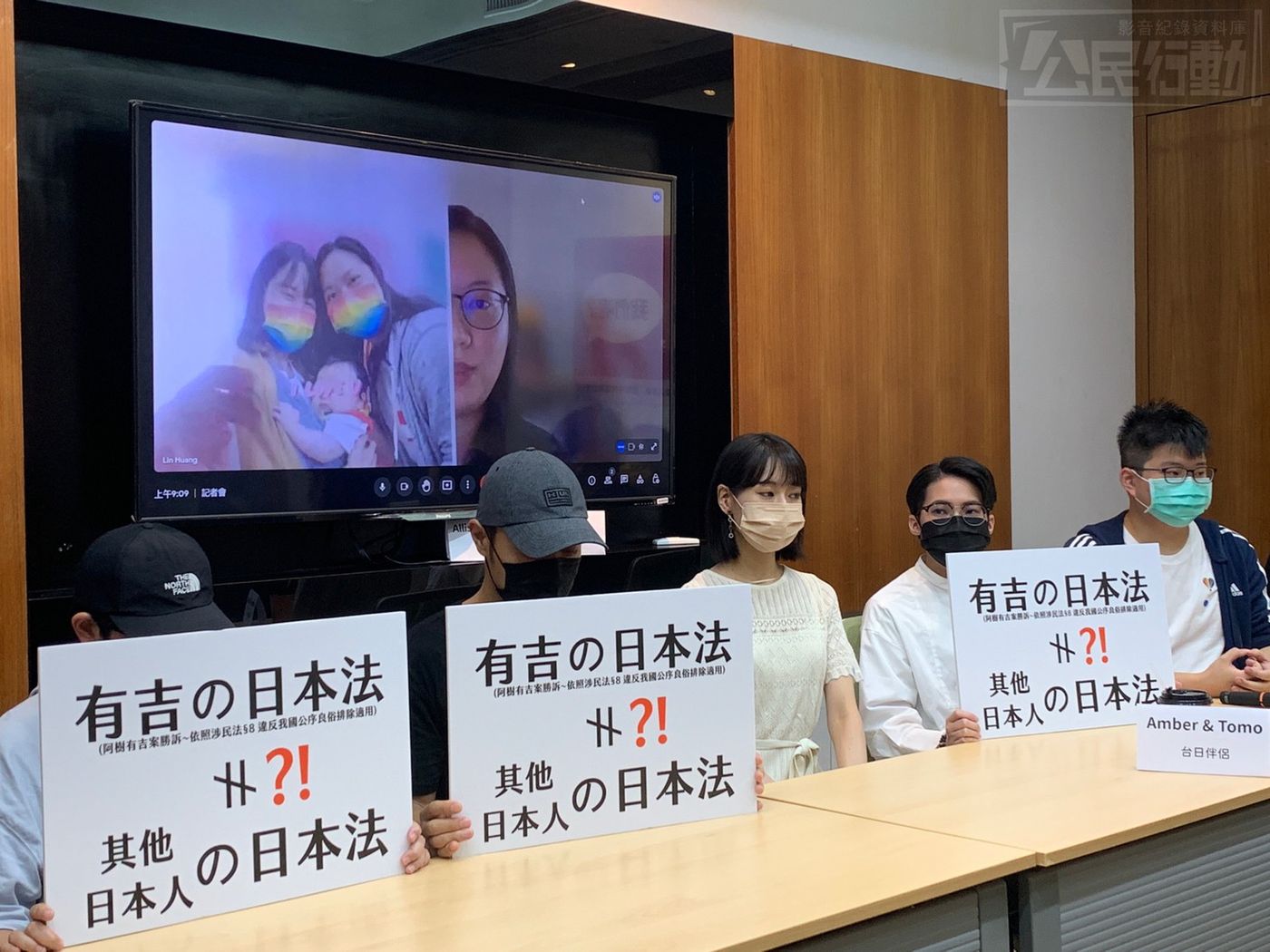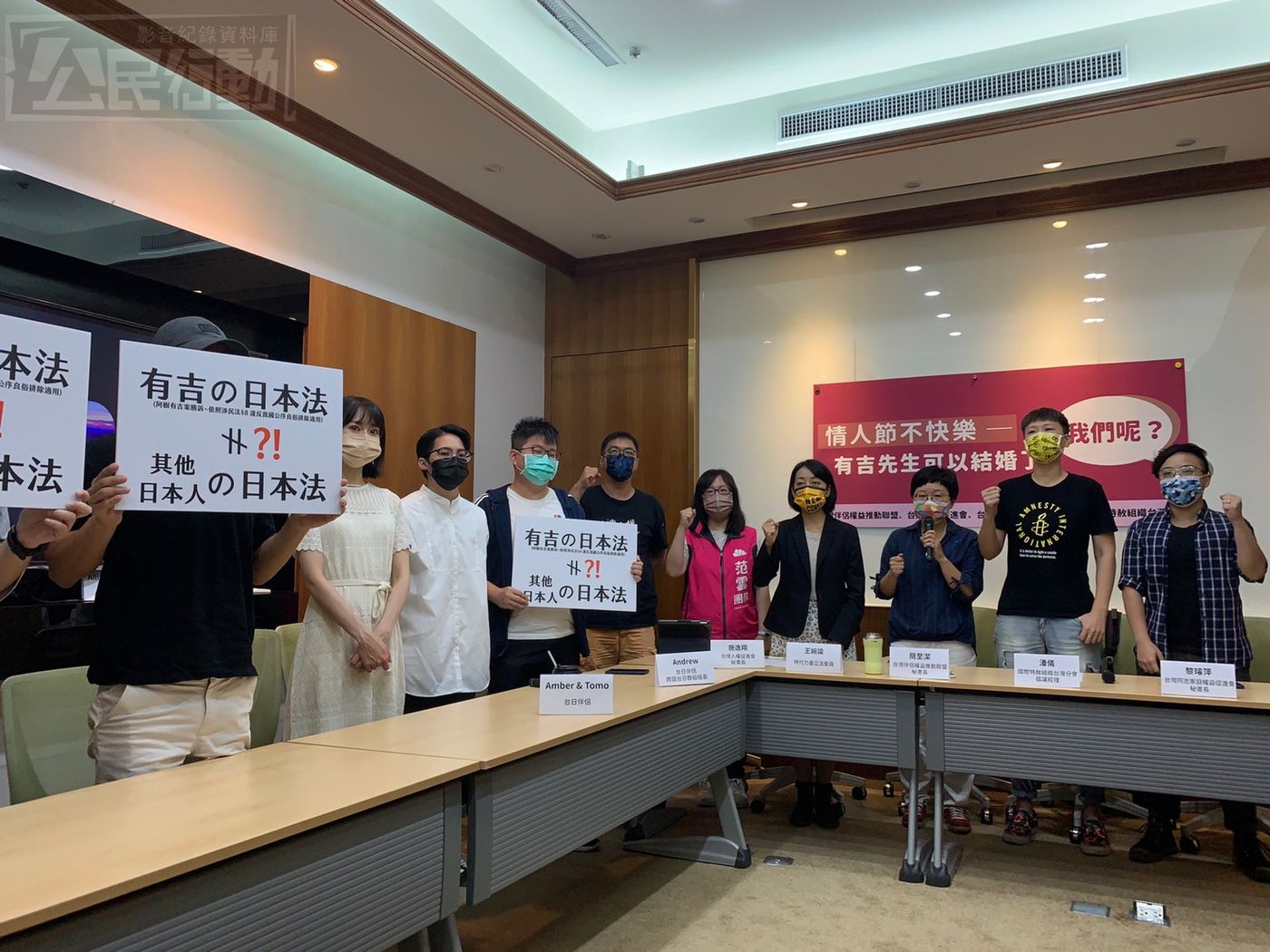
「公民行動影音紀錄資料庫」成立的初衷,是希望將台灣社會中被主流媒體忽略或扭曲的公民行動,以影音形式紀錄下來。十年來,公庫已累積超過3千餘則影音紀錄。我們期望這些紀錄是各界查詢與理解社會事實的管道,因此亦採CC授權作為公共資源。 我們相信,另類媒體的獨立與公共性 須透過群眾認同、涓滴集資才能真正達成 ◈捐款挺公庫:https://donation.civilmedia.tw/
A total of 4 cases of cross-border same-sex marriage have been filed against the Union of Partners, calling for a full opening as soon as possible

Text/Gongku reporter Yang Juru
Taiwan-Japan, Taiwan-Malaysia cross-border same-marriage judgments are based on Article 8 of the "Foreign-related Law"
Jian Zhijie, secretary general of the Alliance for the Promotion of Partner Rights, stated that Yuji and Ashu, a Taiwan-Japan transnational same-sex couple, filed an administrative lawsuit because they could not register their marriage at the Daan Household Registration Office. The Taipei High Administrative Court ruled in favor of the case on 7/21. Related news ), this is also Taiwan's 4th cross-border same-sex marriage winning case. However, the Ministry of the Interior believes that the 4 cases of transnational same-sex marriages were identified as individual cases and cannot be extended to other parties. Hundreds of other transnational same-sex couples are still unable to register their marriages in Taiwan.
Taiwan won 4 cases of transnational same-sex marriages involving Taiwanese citizens marrying people from Macau , Malaysia , Singapore and Japan .
Jian Zhijie said that the administrative court has always recognized the rights of the parties since the cross-border same-sex marriage lawsuit, and neither the government nor the household registration unit has appealed. Among them, the reason for the judgment of the Taiwan-Malaysia-Taiwan-Japan cross-border same-sex marriage lawsuit is that the judge believes that the application of foreign laws can be excluded through Article 8 "Public Order and Good Customs" of the "Law on the Application of Foreign-related Civil Law", because same-sex marriage is in accordance with the "Judicial Yuan Interpretation No. 7" The No. 48 Interpretation and Implementation Law (“748 Implementation Law” for short) is already a part of China’s public order. The prohibition of same-sex marriage by foreign laws should violate China’s public order and good customs and should not be applied.
She mentioned why Taiwan-Japanese transnational couples Yuji and Ashu can get married, but other Taiwan-Japanese or Taiwan-Malaysian couples cannot use the same legal logic to get married?
After the approval of same-sex marriage, the Ministry of the Interior issued a letter to explain to the household registration offices of the lower-level authorities that, because of Article 46 of the Law on the Application of Foreign-related Civil Laws, if the foreigner's domestic law does not recognize same-sex marriage, it will not be accepted because it does not recognize same-sex marriage. Marriage with a national of our country is not recognized if it meets the establishment requirements of its own law. Therefore, the household registration authority is now unable to accept such cross-border marriage registrations.

Andrew is the leader of the Taiwan-Japan same-sex couples group. He speaks on behalf of 21 Taiwan-Japan couples. Andrew said that the judgment in the Ariyoshi-Ashu case has clearly pointed out that Japanese laws violate the public order and good customs of our country and should be excluded from application. Other Taiwanese and Japanese parties are also within the framework of Japanese law and the "Foreign-related Law", so shouldn't they be excluded from application? He thinks this is ridiculous and unfair.
Andrew criticized: "Are Taiwanese and Japanese couples forced to file lawsuits one by one and are willing to file administrative lawsuits to obtain the right to marry? It takes 21 favorable judgments to prove that Japanese laws are excluded from application? The Taiwanese government will continue to waste public funds and allow households Are politicians running around the courts to become defendants?”
Multinational partners struggling with work visas may be easily separated
Amber, a Taiwanese and Japanese multinational partner, appeared together with his girlfriend TOMO. Amber said that he had been with his girlfriend for 6 years, and maintained a long-distance relationship for the first 3 years. Until 3 years ago, he set up his own company to apply for a work visa for his girlfriend.
Amber said that he felt a lot of pressure to maintain his girlfriend's renewal. First, the government stipulated that the company's turnover must reach the target for the next renewal before granting a visa, but the company's business was greatly affected by the epidemic, and it was difficult to guarantee that the target turnover could be achieved; Although you can apply for permanent residency after 5 years of visa, you must stay in Taiwan for more than 183 days every year after obtaining the permanent residency, otherwise the permanent residency qualification will be cancelled.
Amber said that her girlfriend had wanted to go home for the past three years, but because of the epidemic, she was afraid that she would not be able to come to Taiwan after returning to Japan, so she hoped that if the two could get married, they would not have to worry about being forced to separate in the future.

Another couple living in Japan, Allison, has been with Chihana for 4 years and now has an 8-month-old child.
Allison's online video said "I want to go back to Taiwan". Since the Japanese partner and the child are Japanese, and they are staying in Japan on a work visa, the family believes that Taiwanese society has more gender-diverse values, and hopes that the child will be able to settle in Taiwan before school age in the future. The child grew up studying in Taiwan.
However, because Taiwan still does not allow registration of cross-border same-sex marriages, it is more difficult for a Japanese partner and a child to obtain a work visa from Taiwan if the Japanese partner and child cannot marry. There is also uncertainty about her visa in Japan. If there is no guarantee of marriage in Taiwan or Japan, the family life is full of uncertainty, and it may be easy to be forced to separate. She hopes that the Taiwan government will pay attention to the current situation of transnational gay marriage.
Li Yingping, secretary-general of the Association for the Promotion of Gay Family Rights and Interests, said that when transnational same-sex marriage cannot be guaranteed, children will not be able to enjoy full protection of parent-child rights. In Taiwan's legal system, whether children can fully enjoy legal protection usually depends on whether the parent-child relationship with their parents is recognized by the country's laws. However, in many groups of transnational gay families, because one parent is from a country that has not adopted same-sex marriage, their parent-child relationship is not allowed. Children are forced into the legal protection of a single parent. She said that many gay parents don't want to celebrate Valentine's Day anymore. What they really want to celebrate is their wedding anniversary, and they just want to live with their partner and children in ordinary days.

Discriminatory laws should be amended, the government should amend it immediately
Legislator Wang Wanyu said that when the same-sex marriage law was enacted, it was a pity that transnational same-sex marriage was not open due to struggles from all walks of life. The current situation is that transnational same-sex couples who get married in Taiwan must be registered in accordance with the existing laws of the home country of both parties. However, since the adoption of same-sex marriage in 2019, the administrative court has ruled in favor of four transnational same-sex couples.
Can the case only be handled through litigation? Wang Wanyu said that the Times Power Party has proposed a draft amendment to the Foreign -Related Law, and hoped that the Executive Yuan will send the draft to the Legislative Yuan for review as soon as possible, and the relevant amendments can be scheduled for review in the next session of the Legislative Yuan as soon as possible, so as to fully protect the rights of transnational same-sex marriage.
Shi Yixiang, secretary-general of the Taiwan Power Association, said that "there are only three things to do." It is not advisable to make mistakes three or more times in a row, and make mistakes again and again. I advise the Ministry of the Interior not to insist that these are just individual cases, to revoke the illegal release as soon as possible, and waste judicial resources is not what the government should do.
Shi Yixiang mentioned that in May this year, Taiwan held the third international review conference on national reports of the two covenants. One of the international human rights law experts asked the Taiwan government, "Why does the Taiwan government care about the laws of other countries?" Taiwan should apply to everyone, whether it is a native or a foreigner, it should be protected. This is a basic human right.
That's why experts in their concluding observations this year clearly pointed out that Taiwan's same-sex marriage laws are discriminatory, excluding people from countries that do not allow same-sex marriage. If transnational partners choose to live together, their rights in marriage will be denied. protection, members recommended that discrimination in the law be eliminated immediately.
Shi Yixiang called on the Ministry of the Interior and relevant agencies to put forward relevant policies and measures in response to the concluding observations, specifically responding to the discriminatory regulations explicitly accused by the review committee, and not to resolve the problem by the time of the fourth national report review meeting.
【Related reports】
Taiwan refuses to ask the Ministry of the Interior to withdraw its illegal letter
Transnational same-married couples cry about inequality and call on the Executive Yuan to send the bill to trial
////
※We are a non-profit online media "public library", specializing in recording and reporting social movements that have been ignored or distorted in society
We are funded by public support, and donations are welcome , so that we can report better.
Like my work?
Don't forget to support or like, so I know you are with me..
Comment…